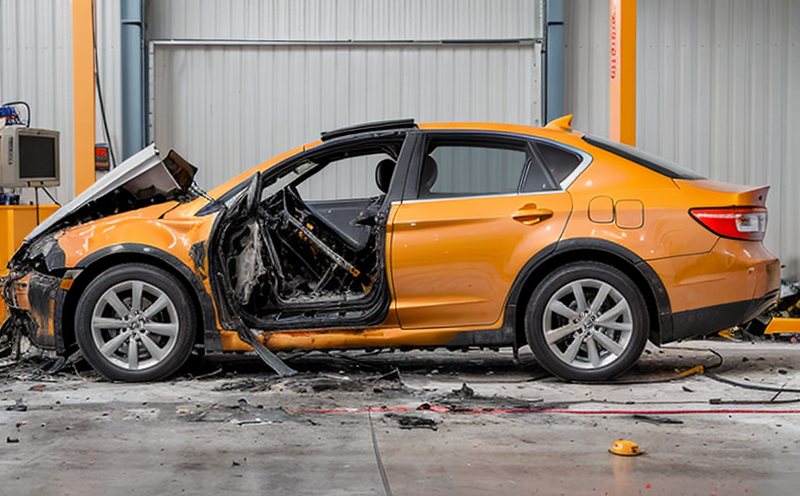SAE J2380 Vibration and Mechanical Abuse Testing of EV Battery Packs
The SAE J2380 standard is a critical component in ensuring the safety, reliability, and durability of electric vehicle (EV) battery packs. This service involves subjecting these components to controlled environmental and mechanical stresses designed to simulate real-world conditions that may lead to failure or degradation.
SAE J2380 specifies tests for vibration and mechanical abuse, which are essential in the development and certification processes of EV batteries. The primary goal is to ensure that battery packs can withstand the physical stressors they might encounter during transportation, installation, and use. This includes impacts from rough roads, drops, and vibrations encountered during normal driving conditions.
Failure modes addressed by this testing include internal short circuits, mechanical damage, and structural integrity loss. By simulating these stresses in a controlled environment, manufacturers can identify potential weaknesses early in the development cycle, allowing for corrective measures to be implemented before commercial release.
The SAE J2380 standard is part of a broader set of guidelines that aim to ensure the safety and performance of EV battery systems. It complements other standards such as ISO 16750-22 (for environmental conditions) and UL 2580 (for safety requirements). Compliance with these standards is crucial for manufacturers aiming to meet regulatory requirements in various markets.
Understanding the context of SAE J2380 requires familiarity with the broader landscape of EV battery testing. Battery packs are subjected to a series of tests that simulate real-world conditions, ensuring they can withstand the rigors of daily use and potential accidents. This includes not only mechanical abuse but also thermal stress, electrical overloads, and moisture exposure.
The importance of this service cannot be overstated, especially as EVs become more prevalent in transportation systems worldwide. As battery technology continues to evolve, so too must the testing protocols that ensure their safe operation. SAE J2380 is a vital tool in this ongoing process, providing a standardized method for evaluating the robustness and reliability of EV batteries.
By adhering to these standards, manufacturers can gain an edge in the competitive market by demonstrating commitment to quality and safety. This service not only meets regulatory requirements but also enhances brand reputation and consumer trust.
Scope and Methodology
| Test Parameter | Description |
|---|---|
| Vibration Test | Simulates the dynamic forces experienced during transportation. The battery pack is subjected to controlled frequency and amplitude vibrations for a specified duration. |
| Drop Test | Replicates potential impacts from dropping or bumping against objects. Specimens are dropped onto hard surfaces from specific heights. |
| Compression Test | Evaluates the structural integrity of the battery pack under compressive forces, simulating conditions during installation or stacking in vehicles. |
| Shock Test | Involves sudden acceleration changes to simulate real-world impacts. The battery is subjected to shock pulses with specified parameters. |
The SAE J2380 standard provides detailed instructions for these tests, including the equipment used and acceptance criteria. Compliance involves not only performing these tests but also documenting results in a manner that meets the requirements of the standard.
For the vibration test, a shaker is typically used to apply controlled vibratory forces to the battery pack. The frequency and amplitude are adjusted according to the specific test parameters outlined in SAE J2380. Post-test inspection involves visual examination for any signs of damage or failure.
The drop test requires specimens to be dropped from specified heights onto a hard surface, such as concrete or steel. Impact forces are measured using accelerometers and other sensors. After each drop, the battery pack is inspected for structural integrity and functionality.
Compression tests involve applying controlled compressive forces to simulate conditions during installation or stacking in vehicles. The force applied is gradually increased until a specified limit is reached, after which the battery pack's performance is evaluated.
The shock test involves subjecting the battery pack to rapid changes in acceleration, simulating potential impacts from collisions or other sudden events. Sensors are used to measure peak accelerations and duration of the event. Post-test inspection includes checking for any signs of damage or failure.
Environmental and Sustainability Contributions
- Emissions Reduction: By ensuring the safety and reliability of EV batteries, this service contributes to reducing greenhouse gas emissions from transportation.
- Resource Efficiency: The testing process helps in optimizing battery designs for better performance and durability, which can lead to reduced material waste during production.
The SAE J2380 standard plays a crucial role in enhancing the sustainability of electric vehicle technology. By identifying potential weaknesses early in the development cycle, this service allows manufacturers to make improvements that not only enhance safety but also contribute to a more sustainable future.
By ensuring that EV batteries can withstand real-world conditions without failure, SAE J2380 helps reduce the environmental impact of battery disposal and recycling. This is particularly important as the demand for electric vehicles continues to grow.
Competitive Advantage and Market Impact
- Regulatory Compliance: By adhering to SAE J2380, manufacturers can ensure their products meet all relevant safety standards, thus avoiding costly recalls or non-compliance penalties.
- Innovation Lead: Early identification of potential issues through rigorous testing allows for continuous improvement in battery design and technology.
The competitive advantage offered by SAE J2380 testing is significant. Compliance with this standard demonstrates a commitment to quality, reliability, and safety, which are critical factors for consumers when choosing an electric vehicle. This can translate into higher brand loyalty and customer satisfaction.
In the market, compliance with such standards can also open doors to new markets and partnerships. It can enhance a company's reputation as a leader in sustainable technology, attracting investors and partners interested in environmentally responsible businesses.





